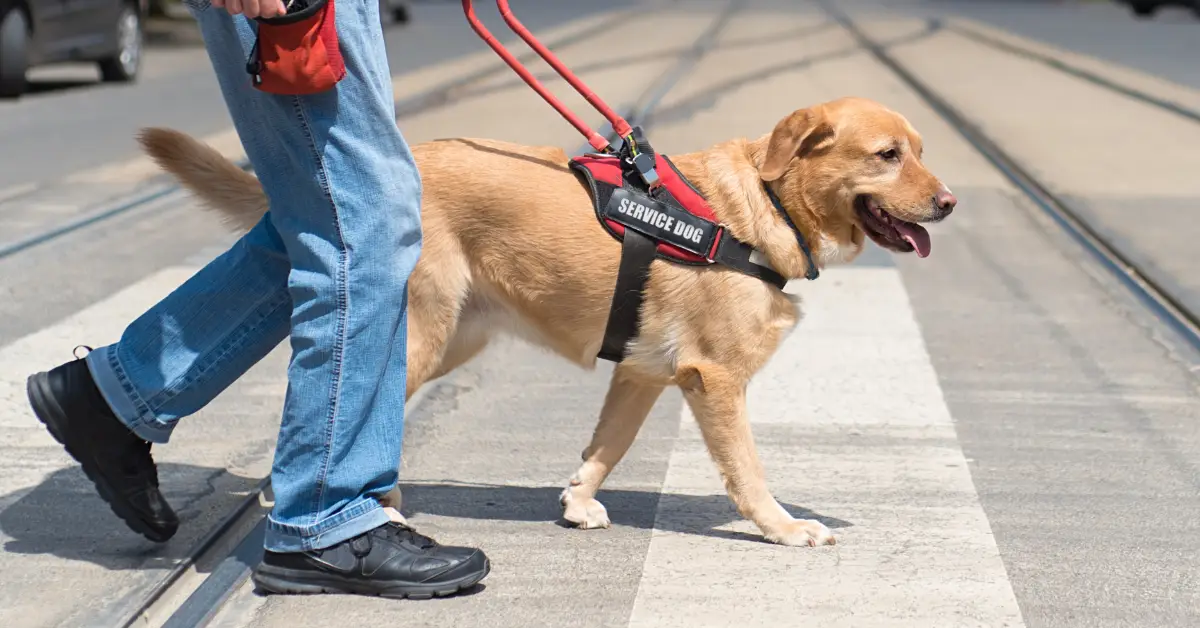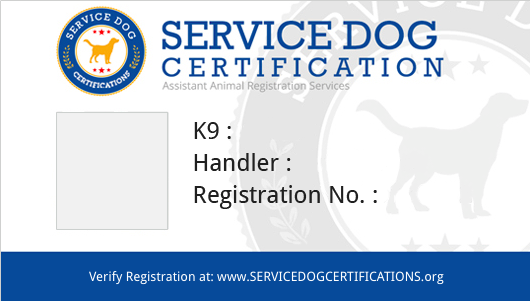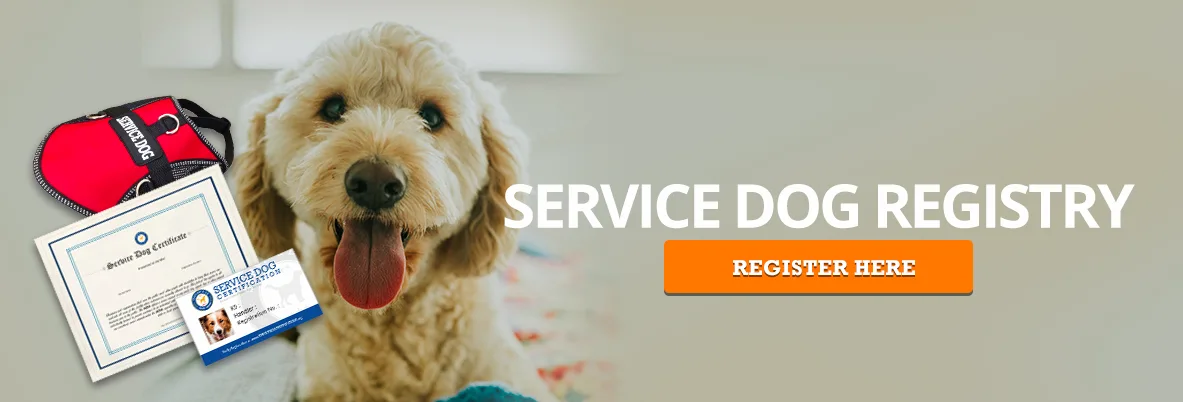ADA Service Dog Laws

You have legal rights in every city and state if you’re a service dog owner, thanks to one important U.S. federal law: the Americans with Disabilities Act (ADA). This law is the reason why you can take your service dog to restaurants, stores, hospitals, and other public spaces where pets can’t go. Under the ADA, you can be asked two questions for verification (is this a service dog for a disability, and what tasks does it perform?), but you can’t be required to have special identification, vests, certificates, registrations, or be forced to reveal sensitive details about your health.
Here are some frequently asked questions about service dog rights under the ADA.
In this article:
- What is a service animal under the ADA?
- How does the ADA define a disability?
- Where are service dogs allowed?
- Can I board flights with my service dog under the ADA?
- What questions am I allowed to ask a service dog owner?
- Do I need a professional trainer to train my service dog? Can I train my service dog myself?
- Which dog breeds can be service dogs?
- Does the ADA give service dog owners housing rights?
1. What is a service animal under the ADA?
The ADA defines a service animal as a dog that has been trained to do work or perform tasks for someone with a disability. Tasks include things like alerting people who are deaf, guiding people who are visually impaired, calming a person during an anxiety attack, reminding people to take medications, or protecting a person who is experiencing a seizure. Check out our list of service dog tasks for more examples.
Service dogs that assist with mental health issues or learning disabilities are called psychiatric service dogs (PSDs). Psychiatric service dogs have the exact same rights as service dogs that assist people with physical disabilities.
2. How does the ADA define a disability?
The ADA defines a “disability” as a “physical or mental impairment that substantially limits one or more major life activities.” In plain English, that means you have a health condition (which can be physical or mental) that greatly affects your ability to do everyday things like work, socialize, sleep, or go to school.
Here’s what these conditions can look like in real life: A combat veteran whose dog interrupts nightmares and creates safe spaces in crowds, allowing them to finally hold down a job or enjoy dinner with family. Or think about someone with mobility challenges whose dog retrieves medications, opens doors, and provides stability, turning everyday tasks from exhausting battles into simple accomplishments. Even invisible conditions like diabetes benefit, with dogs trained to detect blood sugar drops through scent alone, alerting their handler before a life-threatening episode occurs.
Some people assume that service dogs are only for people who are visually or hearing impaired, but that’s far from the truth. The ADA recognizes a wide range of disabilities — check out our list of qualifying disabilities for a service dog to get a better idea of what’s covered.
3. Where are service dogs allowed?
Under the ADA, service dogs are allowed in any areas open to the public. This includes places like restaurants, grocery stores, retail stores, hotels, office buildings, school campuses, and parks.
There are exceptions, of course. A service dog can be asked to leave if they pose a direct threat (like showing aggression), behave disruptively (excessive barking or inappropriate elimination), or when the space itself creates safety concerns for everyone involved (like sterile operating rooms or active construction zones).
4. Can I board flights with my service dog under the ADA?
You can board flights with your service dog free of charge, but that right isn’t actually given under the ADA. Service dog handlers have air travel rights under the Air Carrier Access Act. While ADA rules don’t require you to have documentation for a service dog, the Department of Transportation does. Before flying with a service dog, you will need to complete the DOT’s Service Animal Air Transportation Form and give it to your airline. Check out our guide on how to fly with a service dog for more detailed information on how you can board flights with your service dog.
5. What questions am I allowed to ask a service dog owner?
Under the ADA, the staff or employees at a public establishment such as a restaurant, bar, store, hotel, office building, or school can only ask two limited questions if it’s not obvious how the service dog helps:
- Is the dog a service animal that is required because of a disability?
- What work or task has the dog been trained to perform?
The staff member cannot require a doctor’s note, inquire about the specifics of your disability, ask for an identification card or training certificate, or demand other medical documents.
In addition, staff members aren’t allowed to ask you to have your service dog demonstrate its skills. The two questions above are also only allowed if the disability is not apparent. For example, if the service dog is being used as a guide dog for a blind person, it wouldn’t be appropriate to interrogate them about their service dog since it’s usually apparent why they require the service animal.
6. Do I need a professional trainer to train my service dog? Can I train my service dog myself?
ADA service dog rules do not require that service dog handlers use a professional trainer. To make your dog a service dog, you do not need to complete any specific training program. Service dog handlers are allowed to train their dog themselves without the help of a professional trainer or training program.
Service dog owners should note that under ADA rules, service dogs in training are not yet considered to be service animals. That means that before you can enjoy all of the rights afforded to service dog owners under the ADA, your dog must be fully trained to perform tasks that help with your disability. However, some state laws, like in California, and local laws may give rights to dogs that are still in the training stages.
Check out our guide on training service dogs if you’re curious about what goes into self-training a service dog.
7. Which dog breeds can be service dogs?
Under ADA rules, a service dog can be of any breed. A public establishment is not allowed to prohibit entry for a service dog solely based on its breed. The service dog may be asked to leave the premises if it is not under the control of the handler or acts in a way that threatens the health and safety of others. However, staff members at an establishment cannot ask a service dog to leave simply because they are afraid of the dog solely due to preconceived notions about the dog’s breed.
8. Does the ADA give service dog owners housing rights?
You have the right to have your service dog in a no-pets building without paying pet fees, but that right is given to you under the Fair Housing Act, not the ADA. Under the FHA, your landlord has to reasonably accommodate your service dog. That means it can’t apply no-pet restrictions, breed bans, or size limits. You also can’t be forced to pay pet rent or a pet deposit for your service dog.
About the Author: The writing team at Service Dog Certifications is made up of folks who really know their stuff when it comes to disability laws and assistance animals. Many of our writers and editors have service dogs themselves and share insights from their own experiences. All of us have a passion for disability rights and animals.
Latest Posts

Dangerous Materials Hiding in Your Dog Products
Jake’s German Shepherd began developing strange rashes around his collar. Three vet visits later, they figured out the leather was treated with chromium — a chemical that irritates sensitive skin. Jake had no idea his dog’s collar contained industrial chemicals. Most dog owners don’t know what goes into the products they buy. Many companies use […]

Read More

Can You Bring a Service Dog to a Basketball Game?
Yes, you absolutely can bring your service dog to basketball games. Whether you’re heading to your local high school tournament, a packed college rivalry game, or splurging on NBA tickets, the Americans with Disabilities Act protects your right to be accompanied by your service dog anywhere the public can go. When you arrive, venue employees […]

Read More

Best Pet Health Insurance Providers
If you own a pet, you know how important — and expensive — vet care can be. One way to offset those costs is to purchase pet health insurance. Like typical health insurance, pet insurance is available at many price points, and can cover all, most, or only some of your vet-related costs. It can […]

Read More


